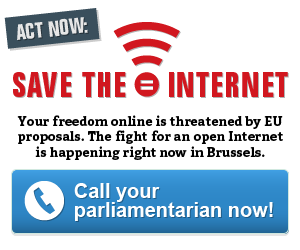Paris, 6 February 2014 — In the coming days, committees of the European Parliament will decide the fate of Net neutrality in Europe. Ahead of European elections, our representatives cannot miss this opportunity to truly defend EU citizens’ rights, protect communications online and thus guarantee freedom of expression and information throughout Europe.
In early September, the EU Commission adopted its anti-Net neutrality Regulation. The legislative process in the EU Parliament will soon take a crucial step, as the Industry (ITRE) committee – the leading committee responsible for this file – will vote on the final report on 24 February. In the meantime, next Wednesday, 12 February, the Civil Liberties (LIBE) committee will adopt its opinion report which will feed back into the debate in the ITRE committee. After these last two votes the fate of Net neutrality in Europe will almost be sealed. The next and final step of the parliamentary procedure being the vote in the EU Parliament plenary, currently scheduled for early April.
Unfortunately, the current political climate makes it hard to predict any outcome. On one hand, MEPs in support of Net neutrality propose to beef up this principle:
- ensuring that traffic prioritisation will not result in anti-competitive deals between service providers and telecom operators
- providing elements to enforce Net neutrality at the national and European levels.
On the other hand, other MEPs – in particular Pilar del Castillo Vera (ES – EPP), lead rapporteur on this dossier, and Jens Rohde (DN – ALDE), shadow rapporteur for the ALDE group – seek to spare the telecom lobbies and remain evasive on these important issues.
The main hope for the protection of the open Internet lies now with the Socialists and Democrats (S&D) since their shadow rapporteur, Catherine Trautmann (FR – S&D) – contrary to the EPP and ALDE rapporteurs – has already driven her group towards the formulation of good proposals1She co-authored amendments on the creation of an enforcement mechanism to ensure a genuine Net neutrality (AD 678); the introduction of the freedom to connect any device to the network (AD 585); the insertion of a functional separation of specialised services from the open Internet (AD 360).. However, these proposals still leave serious voids and need to be improved. In particular, it is mandatory to avoid any anti-competitive practices – due to the introduction of specialised services – and clarify that no service already available on the Internet could be reproduced as a specialised service in a closed network. Speaking of which, it is encouraging to notice that some socialist MEPs, such as Françoise Castex (FR – S&D), have already tabled strong amendments in this respect. Moreover, Dimitrios Droutsas (GR – S&D) – in view of the LIBE opinion – has recently tabled amendments2AD LIBE 34, 54, 95 geared to eliminate those risks and thus reinforce his group’s position. However, for these amendments to be useful, it is mandatory that the Socialist rapporteur defend them in the ITRE committee. Will Catherine Trautmann take up the challenge to seriously fight against anti-Net neutrality provisions and finally, respond to the concerns expressed by citizen advocacy groups?
“Neither the EU Commission nor the EU Parliament rapporteur Pilar Del Castillo have clearly formulated their stand on Net neutrality. For dubious reasons, they refuse to even address proposals made by citizen groups from all across Europe. As crucial votes on Net neutrality get closer, a broad citizen mobilisation can ensure that MEPs are held accountable for what they vote for, especially in light of upcoming European elections”, concludes Félix Tréguer, cofounder of the association La Quadrature du Net.
For more information, please read our last analysis here.
Every European citizen can act to influence the evolution of Net neutrality by calling on their MEPs to establish solid protections of the free Internet. To get on board, please visit the campaign website savetheinternet.eu.
References


